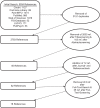Family Members of Adults with Intellectual Disability Living in Residential Settings: Roles and Collaboration with Professionals. A Review of the Literature
- PMID: 33631985
- PMCID: PMC7919211
- DOI: 10.1177/0046958021991301
Family Members of Adults with Intellectual Disability Living in Residential Settings: Roles and Collaboration with Professionals. A Review of the Literature
Abstract
The aim of this article is to review the literature concerning the role of family members of adults with an intellectual disability living in diverse residential settings and their collaboration with residential staff. Whenever the scarce literature on the subject allowed, the focus was laid on family members of persons with additional challenging behavior. Electronic databases, reference screening, and hand search of selected journals was employed to collate literature using key terms such as family members, intellectual disability, and residential setting. By extracting relevant data of the eighteen articles that fulfilled all inclusion criteria, the following 3 main themes with each subthemes were identified inductively: roles of family members after the transition, the effects of the transition on family members, and the collaboration between the family members and professional care staff. This review presents the different roles family members partake and highlights the importance of regular open two-sided communication for collaboration with professional staff to be successful. Practical implementations are discussed and the need for further research in the field is indicated.
Keywords: challenging behavior; family member; intellectual disability; residential institution; successful collaboration.
Conflict of interest statement
Figures
References
-
- Baker BL, Blacher J. For better or worse? Impact of residential placement on families. Ment Retard. 2002;40(1):1-13. - PubMed
-
- Braddock D, Emerson E, Felce D, Stancliffe RJ. The living circumstances of children and adults with MR/DD in the United States, Canada, England and Wales, and Australia. Ment Retard Dev Disabil Res Rev. 2001;7:115-121. - PubMed
-
- Fritschi T, Von Bergen M, Müller F, et al. Bestandesaufnahme des Wohnangebots für Menschen mit Behinderungen. Schlussbericht zuhanden des BSV. Berner Fachhochschule; 2019.
-
- Alich S. Angehörige erwachsener Menschen mit Behinderung. Ein Problemaufriss: empirisch-exemplarische Darstellung zur Lebenslage Angehöriger von Menschen mit Behinderung in Einrichtungen der Behindertenhilfe. Lit; 2011.
-
- Blacher J, Baker BL. Toward meaningful family involvement in out-of-home placement. Ment Retard. 1992;30(1):35-43. - PubMed
Publication types
MeSH terms
LinkOut - more resources
Full Text Sources
Other Literature Sources



